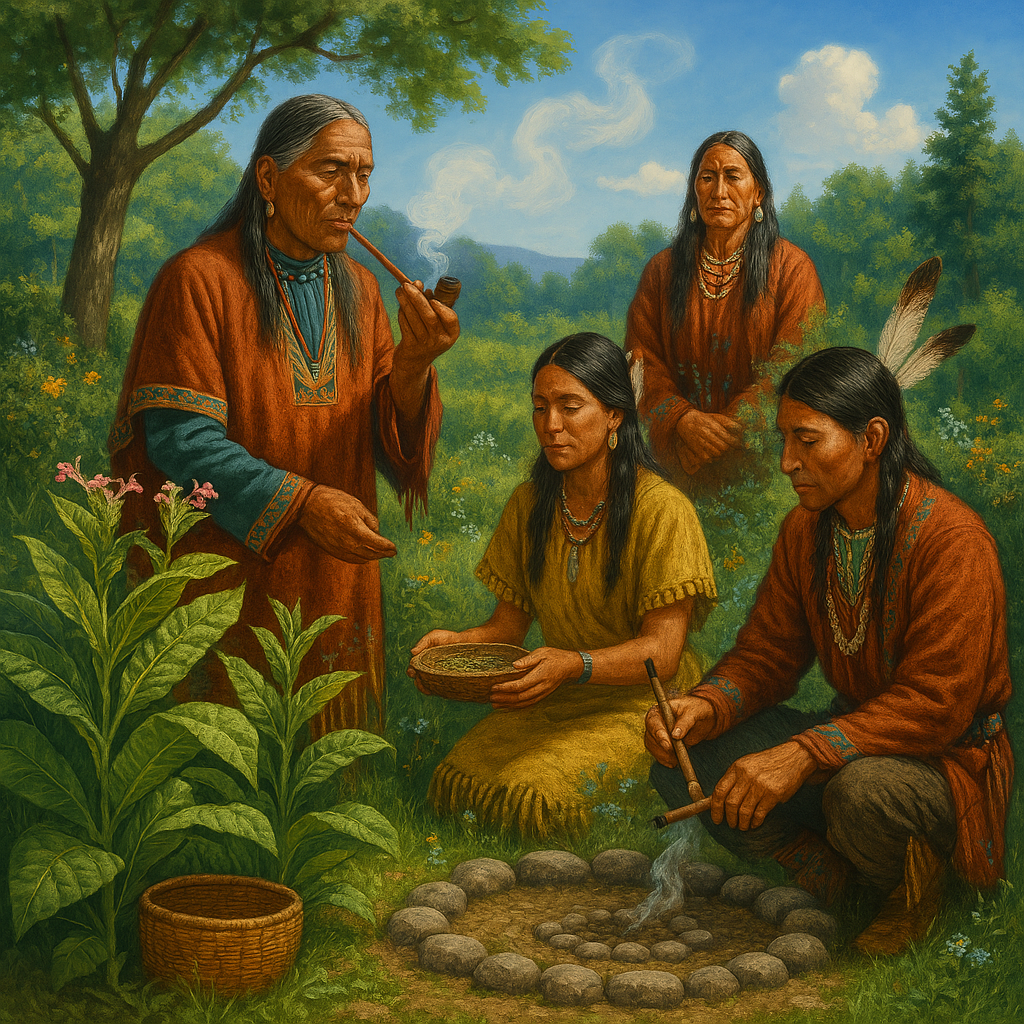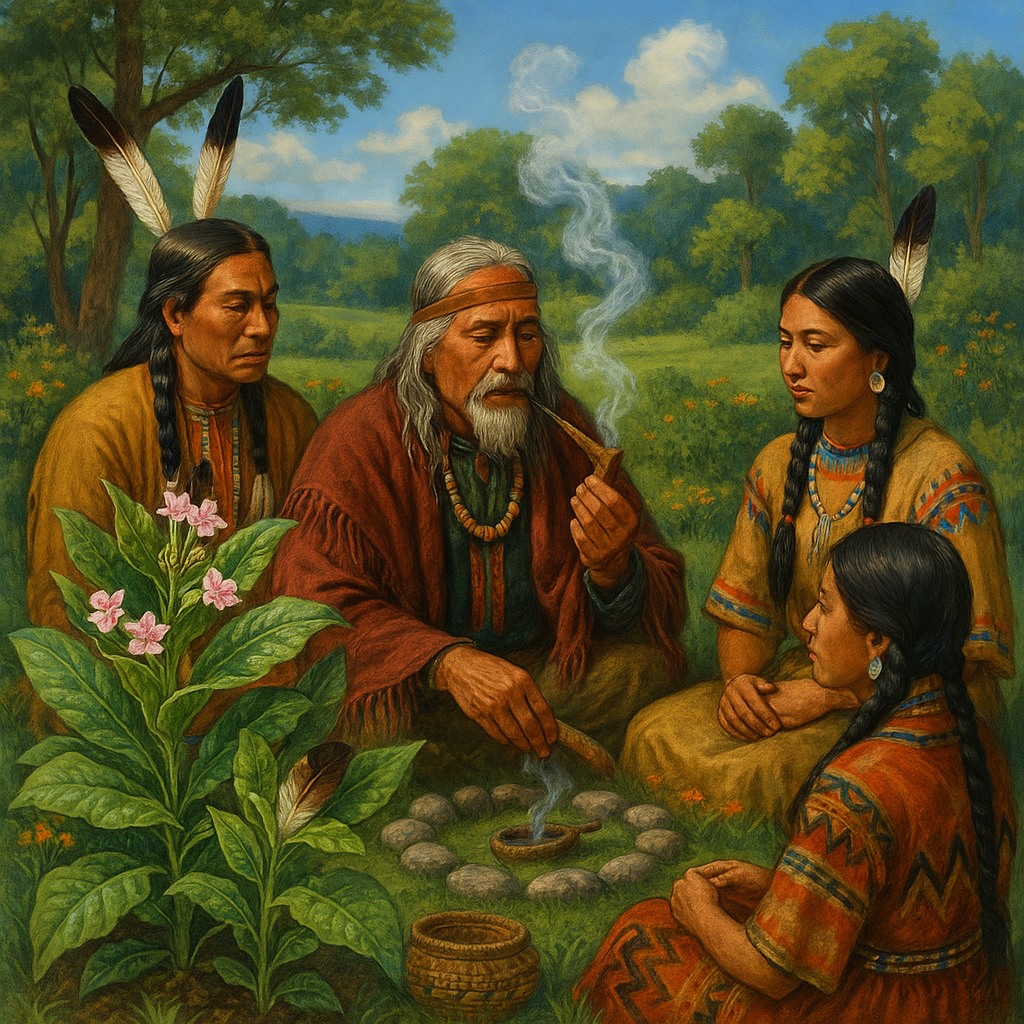Native American tobacco use holds profound cultural, spiritual, and historical significance within Indigenous communities. This significance is deeply rooted in the traditions and values that have been passed down through generations, illustrating the integral role tobacco plays in the lives of Indigenous peoples. What’s more, it symbolizes tribal sovereignty and the deep connection to the land.
Tobacco has played a crucial role in the cultural practices of Native Americans for centuries. Traditionally, Indigenous peoples cultivated tobacco for ceremonial use, recognizing its power and importance. Moreover, the use of traditional tobacco reflects a deep respect for nature and the environment, emphasizing the sacred bond between the land and the people. This respect is not only a cultural norm but also a vital aspect of their identity, showcasing how deeply intertwined their practices are with the natural world.
The history of tobacco among Native Americans is rich and complex. It is a narrative that encompasses not just the use of the plant, but also the stories, rituals, and beliefs that surround it, making it a cornerstone of their cultural heritage. It encompasses various indigenous practices that highlight the significance of tobacco in community gatherings and spiritual ceremonies. By the same token, the cultivation of tobacco represents a form of tribal sovereignty, allowing communities to maintain their cultural identity and practices. Furthermore, tobacco has historically been used in peace treaties and as a means of communication with the divine among Native Americans. These practices highlight the multifaceted role of tobacco, serving as a bridge between the earthly and the spiritual realms, and reinforcing its importance in maintaining harmony within communities.
In contrast, modern society often exploits tobacco for commercial gain, overshadowing its sacred roots. This exploitation starkly contrasts with the reverence shown by Native Americans towards tobacco. Understanding this contrast is crucial for recognizing the broader implications of tobacco use and the need for respectful engagement with Indigenous practices. All things considered, understanding the cultural significance of Native American tobacco use is essential for appreciating its role in Indigenous identity and heritage. As shown above, tobacco is not merely a product; it embodies a rich history and a profound connection to community and spirituality.
Discover How Native American Tobacco Use Shapes Identity and Ceremony
This sacred plant embodies deep cultural significance, connecting individuals to their ancestors and traditions. The sacredness of tobacco is not just a matter of tradition; it’s a living testament to the resilience of Native cultures. The role of traditional tobacco in ceremonies allows tribes to convey their cultural values and strengthen social connections. Imagine the stories that each puff of traditional tobacco could tell, weaving together the past and present in a single breath. These ceremonies serve not only as a means of expression but also as a vital link to their ancestors, reinforcing the continuity of their cultural identity.
Native American tobacco use has deep historical roots, emphasizing its significance in various cultural practices. Emphatically, tobacco was not merely a recreational substance but a vital part of spiritual and ceremonial life among many tribes. As opposed to commercial tobacco, indigenous practices involve the cultivation of traditional tobacco varieties that are often organic and free from additives. In a world where everything seems disposable, the enduring nature of traditional tobacco reminds us of the value of heritage. This distinction is essential, as it reflects a commitment to health and sustainability that is often overlooked in mainstream discussions about tobacco use. Additionally, tobacco history among Native Americans includes its use in peace treaties and as a means of communication with the divine.
Another aspect is the role of tobacco in tribal sovereignty, where tribes assert their rights to cultivate and use tobacco according to their customs. Due to its cultural importance, tobacco is often integrated into various ceremonies, such as weddings and healing rituals. Think of tobacco as a thread that weaves together the fabric of community, binding people through shared rituals and experiences. Overall, the reverence for tobacco among Native Americans highlights its role in preserving traditions and fostering community cohesion. This preservation is not merely about maintaining practices; it is about ensuring that future generations understand and appreciate the significance of their cultural heritage.
To emphasize, the cultivation of traditional tobacco varieties showcases the dedication of Native American communities to sustainable agriculture. Many tribes prioritize organic farming methods, ensuring that their practices align with their cultural values. The commitment to sustainable practices is like planting seeds for future generations, ensuring that the cultural garden continues to flourish. This approach not only sustains the land but also reinforces the spiritual connection to nature. By prioritizing sustainable practices, Native American communities demonstrate their commitment to environmental stewardship, which is a fundamental aspect of their cultural identity. Furthermore, the use of tobacco in ceremonies serves as a reminder of the importance of respecting the earth and its resources. Such practices illustrate the profound relationship between Native Americans and their environment, emphasizing the need for sustainable cultivation methods.
In summary, Native American tobacco use encompasses a rich tapestry of cultural practices and beliefs. The sacred plant plays a crucial role in spiritual rituals, community gatherings, and the assertion of tribal sovereignty. The journey of understanding Native American tobacco use is like peeling back the layers of an onion; each layer reveals deeper insights into identity and heritage. By understanding the significance of tobacco, one can appreciate its vital role in the identity and heritage of Indigenous peoples.
Why Traditional Tobacco is sacred in Native American culture
Imagine a gathering where the air is filled with the rich aroma of traditional tobacco, connecting people to their ancestors and culture. This sacred plant holds a multifaceted significance in Native American cultures, intertwining health, spirituality, and community traditions. The role of traditional tobacco in ceremonies allows tribes to convey their cultural values and strengthen social connections. These ceremonies serve not only as a means of expression but also as a vital link to their ancestors, reinforcing the continuity of their cultural identity.
In many Indigenous cultures, such as in the case of the Lakota, tobacco plays a vital role in prayer and offerings. This practice emphasizes the deep respect for the plant, which serves as a bridge between the physical and spiritual realms. In a sense, tobacco is the heartbeat of many ceremonies, pulsing with the rhythm of tradition and spirituality. To clarify, the understanding of tobacco among Native Americans is multifaceted, encompassing health, spirituality, and community bonding.
To say nothing of the fact that tobacco cultivation practices are often passed down through generations, preserving traditional knowledge. The legacy of tobacco is like a river, flowing through generations, carrying with it the wisdom of the past. By the time of European contact, tobacco had already established itself as a staple in many Native cultures, highlighting its long-standing significance. Different from modern perceptions, the indigenous view of tobacco is one of respect and reverence, contrasting sharply with its commercial exploitation.
Especially in contemporary times, there is a resurgence in the appreciation of traditional tobacco practices among Native communities, reflecting a renewed commitment to cultural heritage. As we witness this resurgence, it’s like watching a phoenix rise, symbolizing hope and renewal in cultural practices. Generally, the relationship with tobacco is viewed as a sacred bond, integral to the identity of many tribes. A comprehensive appreciation of Native American tobacco practices involves acknowledging their diverse cultural and spiritual significance. This acknowledgment is crucial for fostering respect and understanding between Indigenous and non-Indigenous communities, paving the way for meaningful dialogue and collaboration.
So, the ongoing dialogue about tobacco use must consider these rich traditions and practices. The dialogue about tobacco is not just a conversation; it’s an invitation to understand and respect a rich cultural narrative. Eventually, this understanding can lead to greater respect for indigenous rights and practices surrounding tobacco.

Discovering the Legacy of Native American Tobacco Use as We Reflect on Its Significance
Tobacco has long served as a cornerstone of Native American culture, embodying deep spiritual and communal values. This sacred plant plays a vital role in rituals and ceremonies, fostering connections among individuals and their communities. What’s more, it symbolizes tribal sovereignty and the deep connection to the land, reflecting the rich history of indigenous practices.
Tobacco cultivation has been integral to Native American life for centuries. Traditionally, tribes used tobacco in various ceremonial contexts, emphasizing its importance in spiritual practices. In addition, the multifaceted significance of tobacco intertwines health, spirituality, and community traditions, showcasing its role in maintaining cultural heritage.
To emphasize, the use of tobacco extends beyond mere consumption; it represents a profound connection to the earth and ancestors. Sacred rituals often incorporate tobacco, reinforcing its status as a vital element in community bonding. In short, Native American tobacco use highlights the importance of preserving these cultural practices for future generations.
As opposed to modern perceptions of tobacco, indigenous practices emphasize respect and reverence for this plant. By understanding the historical context and significance of tobacco, we can appreciate its role in tribal sovereignty and cultural identity. To fully appreciate Native American tobacco use, one must recognize its cultural, spiritual, and historical dimensions that shape its significance in Indigenous life. It’s fascinating to think about how traditional tobacco connects people to their roots and the earth. Many might find it inspiring to learn about the sacred rituals that honor this plant. Understanding tobacco history can deepen appreciation for indigenous practices and their significance today. Overall, recognizing the role of tobacco in tribal sovereignty enriches the conversation about cultural identity. So, the next time tobacco is mentioned, consider its profound legacy and the stories it carries.
Listen to an AI-Generated Podcast of this Blog
Unveiling the Sacred Connection of Native American Tobacco
Did you know that traditional tobacco holds immense cultural significance for Native Americans? What’s more, it serves as a vital element in ceremonial use. Tobacco history reveals its role in spiritual practices and community bonding. To this end, many tribes cultivate traditional tobacco varieties, emphasizing organic methods. This cultivation reflects their commitment to tribal sovereignty and cultural identity. Sacred rituals often incorporate tobacco, reinforcing its importance in indigenous practices. All in all, understanding this connection enriches our appreciation of Native American heritage. At last, recognizing the significance of tobacco fosters respect for these cultural practices. So long as we honor these traditions, we contribute to preserving their legacy.
FAQs
What makes traditional tobacco so significant in Native American culture?
Traditional tobacco holds deep cultural, spiritual, and historical significance, connecting Indigenous peoples to their ancestors and traditions.
How does tobacco cultivation reflect tribal sovereignty?
Tobacco cultivation allows tribes to assert their rights and maintain their cultural identity and practices.
Can you explain the role of tobacco in ceremonial use?
Tobacco plays a vital role in ceremonies, conveying cultural values and strengthening social connections among tribes.
What is the difference between traditional tobacco and commercial tobacco?
Traditional tobacco is often organic and free from additives, emphasizing respect and reverence for the plant.
How does tobacco history relate to peace treaties?
Historically, Native Americans used tobacco in peace treaties, symbolizing communication and connection with the divine.
Why do Indigenous practices emphasize sustainable tobacco cultivation?
Sustainable tobacco cultivation reflects a commitment to health, environmental stewardship, and cultural values among Native American communities.
What role does tobacco play in sacred rituals?
Tobacco serves as a bridge between the physical and spiritual realms, integral to many Indigenous ceremonies.
How does Native American tobacco use foster community cohesion?
Tobacco binds people through shared rituals and experiences, reinforcing cultural identity and community bonds.
What is the significance of tobacco in maintaining cultural heritage?
Tobacco practices preserve traditions and ensure future generations appreciate their cultural heritage and identity.
How does understanding Native American tobacco use benefit non-Indigenous communities?
Understanding these practices fosters respect and meaningful dialogue between Indigenous and non-Indigenous communities.
Come Visit Us
We have three fantastic locations we’d love to invite you to! If you’re in the Chicagoland area, you can come chill with us at either our Grayslake or Schaumburg locations. Alternatively, if you’re in Wisconsin, stop by and visit us at our Kenosha lounge. Please note that you must be 21+ to enter with a valid ID. We hope to see you soon!


